Atlantic Monthly Contributors's Blog, page 112
July 28, 2016
The Palestinian Lawsuit Against the Balfour Declaration
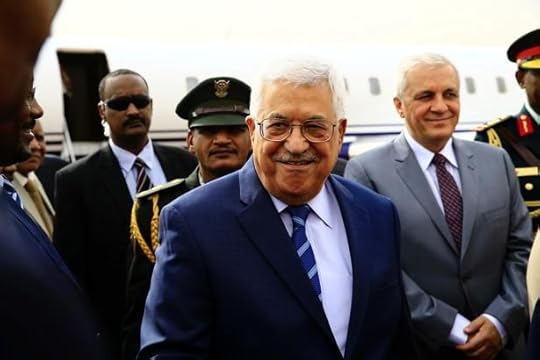
NEWS BRIEF Mahmoud Abbas, the Palestinian National Authority president, said the Palestinian Authority would sue Britain for its support of the Balfour Declaration, a document which in 1917 laid the groundwork for Israel’s founding, according to Haaretz.
The announcement was made on Abbas’ behalf by Riad Maliki, the Palestinian foreign minister, on Wednesday at the opening of the 27th Arab League summit in Nouakchott, Mauritania. Maliki said the suit, which would be filed in an international court, would be made on the grounds that British support for establishing a Jewish homeland in Mandate Palestine led to the Palestinian nakba, or “catastrophe.” Palestinians use the term to describe the displacement of approximately 700,000 Palestinians following the creation of Israel in 1948.
Maliki did not elaborate on what demands the Palestinian lawsuit would include.
The 1917 Balfour Declaration was a written correspondence between Arthur Balfour, the then-British foreign secretary, and Walter Rothschild, a leader in the British Jewish community. It established Britain’s support for the creation of a Jewish national home, and was adopted by the international community after World War II.
His Majesty's Government view with favour the establishment in Palestine of a national home for the Jewish people, and will use their best endeavours to facilitate the achievement of this object, it being clearly understood that nothing shall be done which may prejudice the civil and religious rights of existing non-Jewish communities in Palestine, or the rights and political status enjoyed by Jews in any other country.
Maliki called the declaration a “fateful promise from the ones who don’t own to the ones who don’t deserve.”
Gilad Erdan, the Israeli public secretary minister, called the lawsuit “strange,” warning British and French leaders to not be surprised if the Palestinians extended their lawsuit to include both countries, who divided control of the region in the Sykes-Picot Agreement in 1916.
In addition for calling on Arab states’ support of the lawsuit, Maliki reiterated Abbas’s backing of the French peace initiative aimed at relaunching Israeli-Palestinian peace talks, which last took place in 2014.
The Balfour Declaration will celebrate its centenary in November 2017.

The Riches of 'Cheap Thrills'
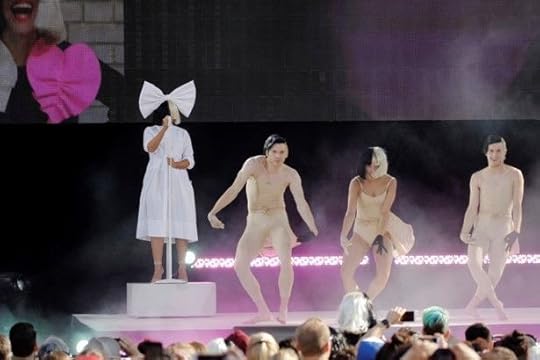
The honorific of “song of the summer” shouldn’t be given out based on chart data alone. The track in question has to be popular, but it also has to trigger a seasonally specific mixture of glee and frivolity and premature nostalgia. At least, that’s what I’d argue in an attempt to disqualify Drake’s “One Dance,” the silky but self-serious song that’s been stuck at the top of the Hot 100 for 10 weeks like cloud cover at a barbecue, or like the grim national mood in June and July.
Clouds begone: Sia’s “Cheap Thrills” just moved into the No. 1 spot, confirming it as the platonic ideal of a song of summer. Macro meaning about the state of the world is not to be found here; its success owes simply to being a well-crafted, sun-soaked dance track with the weight of the record industry behind it. Yet “Cheap Thrills” still feels like a small blessing for the culture, or at the very least it’s a coronation for Sia as one of the best pop titans of our time.
The song was initially released in winter, in advance of Sia’s This Is Acting, a collection of songs that she had once wanted to sell to other singers. “Cheap Thrills” was born when Sia and Greg Kurstin—another hitmaker of the moment, known for Adele’s “Hello” and Sia’s “Chandelier”—set out to write a track for Rihanna. Listening now, you can understand what they were going for: It’s an infectious, islands-influenced ode to partying in the vein of previous Rihanna albums that, it’s now clear, would have been out of place on this year’s glum, arty Anti. (Turns out Rihanna got her own song-of-the-summer contender in the sleek Calvin Harris collaboration “This Is What You Came For.”)
As Sia tells it, the reason she ended up putting “Cheap Thrills” on This Is Acting was that she herself couldn’t stop blasting it in her car. “For some reason, I really liked listening to it, which makes me feel masturbatory, but I wouldn't normally be just jamming out to my own tunes,” she told Rolling Stone. “There's something really uplifting about it that put me in a good mood, and I would just pretend it wasn't me singing. It felt very summer and fun." That quote is from December 2015, and the song’s position as No. 1 song in the country in mid-July 2016 confirms Sia was right about the track’s potential.
Of course she was. Its very first words are “c’mon, c’mon, turn your radio on,” a neat joining of Sia’s hitmaking intentions with the fundamental pleasure of pop music: the itch to celebrate. The Sean Paul remix that’s charting underscores the beat’s tropical lineage, which is fortuitous because, as the New York Times’ Ben Ratliff noted upon Omi’s “Cheerleader” becoming a song of the summer last year, there exists a “proven desire for a reggae or reggae-like worldwide pop hit between Memorial Day and Labor Day.” Add in a call-and-response chorus featuring the irresistible (if often irritating) pop trick of children singing, and it becomes tempting to use the term “laboratory designed” to describe the song’s inevitability as a smash.
Miraculously, though, “Cheap Thrills” comes across like an airing of authentic joy rather than cynical calculation like Justin Timberlake’s fatally chipper “Can’t Stop the Feeling.” Credit on this point goes certainly to Sia, who unfailingly comes across as an individual despite her attempt to transform visually into an unidentifiable everywoman. There’s intelligence in these lyrics about mindless fun: the first verse is about Friday, the second is about Saturday, and the reminder of a ticking clock heightens the urgency of the party-now message. Her voice naturally has a mournful quality to it, and that fact along with the song being in a minor key contributes to the sense of a momentary and vital escape from drudgery. And who wouldn’t smile at how she sings “cash” as “cahsh”?
Sia’s message seems to be that pop makes everyone feel like the same irrepressible, childlike sprite.
Though the lyrics are in a long pop tradition of anti-materialism—from “Can’t Buy Me Love” to “Royals”—there’s big-business muscle helping the song’s rise. The Sean Paul version, which wasn’t on the original album, has meant two launches and two music videos for the track. Its arrival at No. 1 comes around the time of Sia performing it on Good Morning America, headlining a major music festival in New York City, and releasing an amusing Snapchat filter that turns you into Sia singing “Cheap Thrills.” But part of her awesomeness as a pop star is that the marketing also doubles as a gleeful part of the entertainment: Sia’s shtick of hiding her face has transcended accusations of pretentiousness to become something totally lovable and friendly as she’s handed out wigs at her events and made the tweenage modern dancer Maddie Ziegler her avatar in music videos.
Sia’s underlying message, in this song and elsewhere, seems to be that pop makes everyone feel like the same irrepressible, childlike sprite. Both clips for “Cheap Thrills” offer lovely depictions of that idea. The Sean Paul version imagines an American Bandstand-style dance show’s participants having their minds blown by faceless, Sia-bobbed ballroom pros. The other one has Sia on the corner of a stage as Ziegler and two men ridiculously prance, undulate, and make human totem poles. I’ve watched that video at least a dozen times, and it’s hard not to grin whenever the performers make hand rings around their eyes and fan their fingers to the rhythm. It’s the kind of move that, by the end of summer, the masses should be doing on dance floors and shopping aisles, a way to feel the beat for cheap.

The Jihadist Split in Syria

NEWS BRIEF Jabhat al-Nusra, the Syrian jihadist group, has reportedly announced it would split from al-Qaeda, the BBC reported Thursday, citing a video message from the group’s leader.
The BBC said the recording was the first ever by Abu Mohammed al-Julani. In the video, al-Julani says the Sunni militant group, which is fighting against the Syrian government, would change its name to Jabhat Fath al-Sham. The BBC translates that to “Front for the Conquest of Syria.” More:
In the recording aired by al-Jazeera's Arabic news channel, Mr al-Julani thanked the "commanders of al-Qaeda for having understood the need to break ties".
Analysts are divided on the potential significance of the separation and its consequences for al-Qaeda, which has struggled to maintain its allure in the face of a rising Islamic State, a group that favors a combination of heinous acts of violence and jihadist propaganda.
Some analysts say Jabhat al-Nusra may be seeking to avoid air strikes that target al-Qaeda affiliates.
Jabhat al-Nusra, also known as al-Nusra Front, emerged in Syria in late 2011. Charles Lister, a senior fellow at the Middle East Institute and author of “The Syrian Jihad,” wrote in a paper this month that since then, Jabhat al-Nusra “has transformed itself from an unpopular outsider accused of [Islamic State]-like brutality towards one of the most powerful armed actors in the Syrian crisis.”
While the Islamic State has in the last two years become the focal point of most counterterrorism operations, “it is arguably Jabhat al-Nusra in Syria—and perhaps the al-Qaida movement more broadly—that looks more likely to survive over the long term and to threaten local, regional and international security interests,” he said.

July 27, 2016
Inside the 2016 Man Booker Longlist
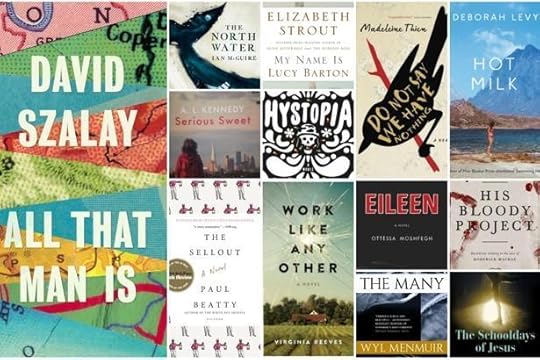
On Wednesday morning the Man Booker Prize for Fiction announced its 2016 “dozen,” a longlist of 13 authors vying for the prestigious literary award. The £50,000 prize is open to authors of any nationality writing originally in English, whose works have been published in the U.K.
This year’s list features five American writers, three debut novelists, and a two-time Man Booker winner. While British authors lead the list with six nods, the selections are noticeably less diverse than in 2015, which had authors from Ireland, Nigeria, India, and Jamaica—whose honoree Marlon James went on to become the country’s first writer to win the prize.
The shortlist will be released on September 13, with the official winner announced at a ceremony in London on October 25. Until then, here’s your guide to the books that made it this far.
J.M. Coetzee, The Schooldays of Jesus
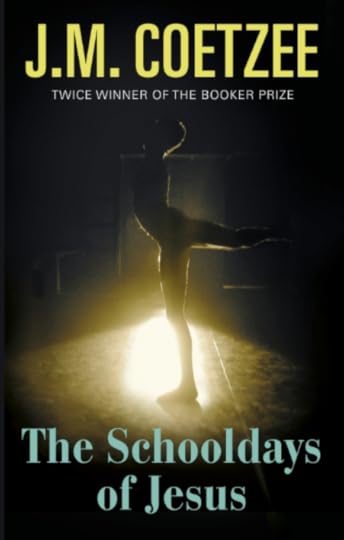
Viking
Having won the Nobel Prize and the Man Booker (twice) already, South African novelist J.M. Coetzee is clearly the decorated veteran of this year’s longlist. The Schooldays of Jesus, the South African’s first novel in three years following 2013’s The Childhood of Jesus, is slated to be released in the UK in September. The story follows little Davíd, an inquisitive boy who immigrates to the town Estrella, where he lives on a farm, learns a new language, and hopes to make friends. He enrolls in an unusual dance academy where he begins to grapple with the troubling discoveries of growing up. Little has been said about Coetzee’s latest work, which seeks to combine allegory, memory, and history to question “how we choose to live our lives.”
Deborah Levy, Hot Milk
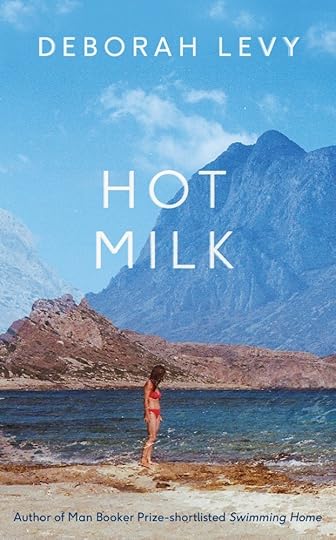
Bloomsbury USA
The British playwright and author returns to the Man Booker list four years after her novel Swimming made the 2012 shortlist. Her latest work explores the tumultuous relationship between a young woman, Sofia, and her mysteriously ill mother. With seemingly no options left, Sofia gives up her quotidian life to travel with her mother to the arid coast of Southern Spain to meet with unconventional physician Dr. Gomez, in hopes of finding answers. “The sun-bleached, Mediterranean setting,” The Guardian wrote, allows for “explorations of troubled familial bonds, of the nature of sexuality, an examination of exile—and repeated motifs of incantatory language.”
Ian McGuire, The North Water
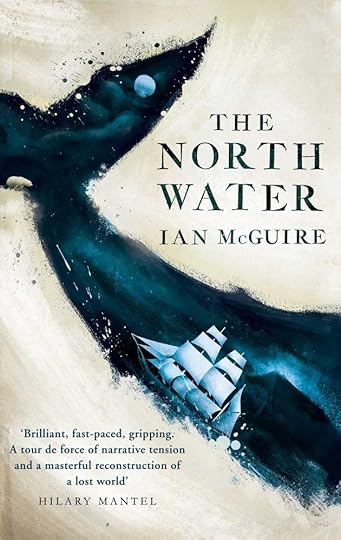
Henry Holt and Co.
The North Water is the second novel from McGuire, the English co-founder and co-director of the University of Manchester’s Center for New Writing. It’s a dark novel that drops readers into the heart—or hull— of The Volunteer, a nineteenth-century whaling ship carrying a mysterious killer aboard. From the freezing, rough waters of the Arctic to the 1857 British siege of Delhi, the novel takes a Melvillian journey and reimagines it as a nightmarish blend of historical fiction and thriller. The New York Times describes the book as “the result of an encounter between Joseph Conrad and Cormac McCarthy in some run-down port as they offer each other a long, sour nod of recognition.”
Wyl Menmuir, The Many

Salt
The English author’s debut novel is a surprising entry on the list, published by an independent imprint so small it doesn’t have permanent offices. Its protagonist, Timothy, looks to settle in an isolated coastal village, where strange fish and abandoned boats inhabit its contaminated seas. But as he attempts to renovate a decrepit old house, he begins to ask questions about its previous owner, raising the villagers’ suspicions. “Its portrayal of a community left behind by technology and bureaucracy, suspicious of the threat represented by ‘outsiders,’ is recognizable and timely,” wrote one review. “Perhaps even more so now than the author may have intended.”
Virginia Reeves, Work Like Any Other
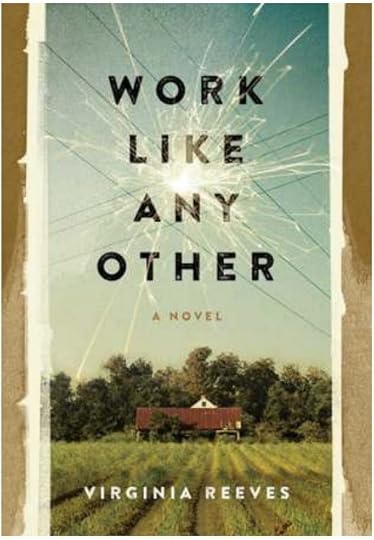
Scribner
The Montana native’s first novel is a pastoral story set in 1920s Alabama, where Roscoe T. Martin, an electrician, is forced to leave his life in the city and move with his son and wife to work on her family’s farm. There, he begins to illegally siphon electricity, until an official from the utility company who discovers the wires is electrocuted, and Roscoe is sent to jail for manslaughter. The novel follows Roscoe as he tries to survive in prison, abandoned by his family and consumed by guilt. The New York Journal of Books found Reeves’ debut to be “a deeply gripping portrayal of Americana in the Deep South, replete with racism, violence, and heartbreak.”
Paul Beatty, The Sellout
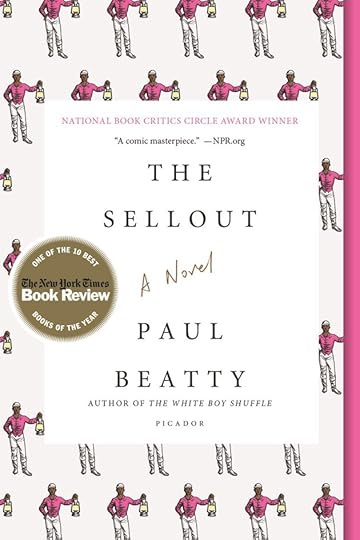
Farrar, Straus and Giroux
The American writer’s fourth novel, The Sellout, is a wild satire whose narrator, nicknamed “Bonbon,” tries to save his south L.A. hometown by bringing back slavery and segregation. Beatty mocks the absurdities of believing in a “post-racial America,” taking his characters to narrative extremes (when readers first meet the protagonist, he’s sitting in front of the Supreme Court). Despite its heavy subject matter—police killings, father-son relationships, servitude—The Sellout is alive with humor. NPR said the novel “isn’t just one of the most hilarious American novels in years, it also might be the first truly great satirical novel of the century.”
David Szalay, All That Man Is
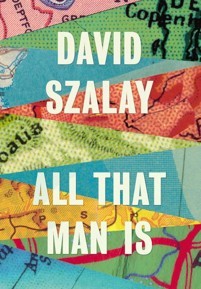
Graywolf Press
Szalay’s fourth novel pulls together nine distinct narratives of men at different stages of their lives to ask a single question: What does it mean to be a man in the 21st century? Weaving a tale rife with boyish desire, psychological angst, and literary references, the Canadian-born author closes the gap between short fiction and the novel with this series of vignettes. “Szalay is in pursuit of the feel of a specific moment, whether that feel is lyrical or mundane,” wrote The Telegraph. “It is one of the many ironies of his work that it brings a sensory richness to the bleak and the drab.”
A.L. Kennedy, Serious Sweet

Jonathan Cape
The British writer’s eighth novel tells the story of two troubled protagonists—one a middle-aged civil servant, the other a bankrupt accountant—who have been penpals, and are preparing to meet in person for the first time. Set over the course of a single day in London, Serious Sweet is an offbeat romance. “Serious Sweet portrays intense lives of quiet desperation,” said a review in The Guardian. “It is a novel about hope and muted courage and, at the end of the day, a very tentatively experienced optimism.”
Graeme Macrae Burnet, His Bloody Project
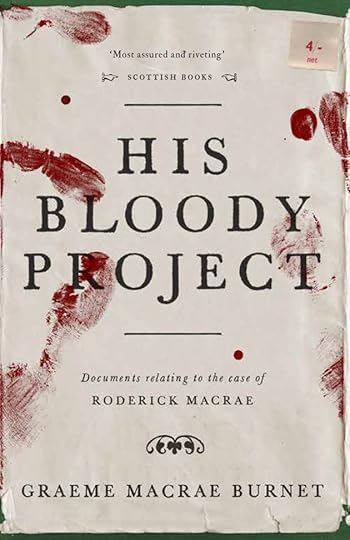
Contraband
The Scottish novelist’s second book is another unexpected entry on the list—a crime thriller that’s only been sparsely covered. His Bloody Project focuses on a triple murder, the arrest of a young man for the crimes, and the question of whether or not he was insane when he committed them. The book is presented as the found memoir of Roderick Macrae, the man accused of committing the murders. “The sense of place, the characterisation and the evocation of a remote nineteenth-century rural community are as brilliant and assured as the suspenseful storyline is gripping,” said one review.
David Means, Hystopia
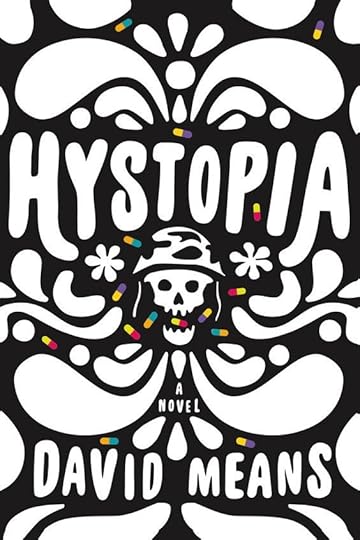
Farrar, Straus and Giroux
Means has written four critically acclaimed short-story collections, but this is the American writer’s debut novel—one that considers the ever-important question of the emotional costs of war. Hystopia is a book-within-a-book written by a 22-year-old Vietnam veteran before he commits suicide. The work in question takes place in a reimagined version of the 1960s and ’70s: an alternate history where President Kennedy has lived through multiple assassination attempts and has taken drastic means to eradicating mental illness in returning soldiers. The Atlantic’s Amy Weiss-Meyer writes that the structure of the novel “is a testament to Means’s belief in the power of stories that demand to be told.”
Ottessa Moshfegh, Eileen
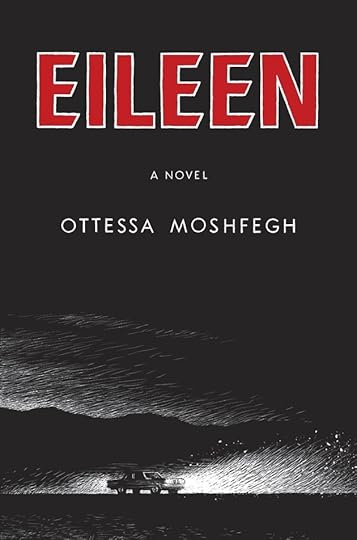
Penguin Press
Set in Boston in the 1960s, the American author’s second novel revolves around an unhappy young woman who has to care for her alcoholic father while working a day job as a secretary at a prison for delinquent boys. But she longs for freedom, and when a new co-worker arrives, Eileen is intrigued, and things begin to change. NPR praised the “sweetly sinister humor in Moshfegh’s prose,” declaring that “Eileen is a coming-of age novel about a formidable, yet flawed young woman.”
Elizabeth Strout, My Name Is Lucy Barton
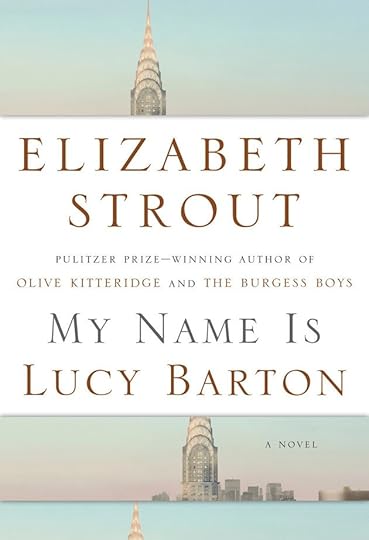
Random House
Published eight years after Strout’s Pulitzer-winning work Olive Kitteridge, the American author’s fifth novel tells the story of Lucy, a woman in the hospital recovering from an infection, and her mother’s efforts to reconnect with her. Over the course of the visit, old wounds are reopened—and the narrator’s painful childhood memories and family frustrations come to the surface. The New York Times , “There is not a scintilla of sentimentality in this exquisite novel,” determining that “My Name Is Lucy Barton offers us a rare wealth of emotion, from darkest suffering to simple joy.”
Madeleine Thien, Do Not Say We Have Nothing
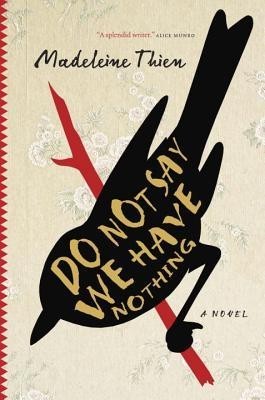
Knopf Canada
The latest work from the Canadian short-story writer and novelist follows the members of a single family in China, both before and after the country’s Cultural Revolution in 1966. The sprawling work stretches across decades and geographical regions as it delves into the lives of countless fascinating characters. The Globe and Mail has called the book “an intergenerational saga” that “will cement [Thien] as one of Canada’s most talented novelists.”

Donald Trump's Crimean Gambit
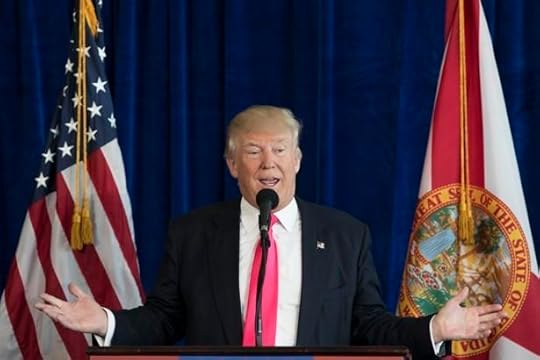
Donald Trump’s call on Russia to hack Hillary Clinton’s emails Wednesday resulted in widespread criticism. But his comments on Crimea, coupled with ones he made last week on NATO, are likely to have greater significance if he is elected president in November.
The question came from Mareike Aden, a German reporter, who asked him whether a President Trump would recognize Crimea as Russian and lift sanctions on Moscow imposed after its 2014 annexation of the Ukrainian territory. The candidate’s reply: “Yes. We would be looking at that.”
That response is likely to spread much cheer through Russia—already buoyant about the prospect of a Trump victory in November. But it could spread at least an equal amount of dread in the former Soviet republics. In a matter of two weeks, the man who could become the next American president has not only questioned the utility of NATO, thereby repudiating the post-World War II security consensus, he also has seemingly removed whatever fig leaf of protection from Russia the U.S. offered the post-Soviet republics and Moscow’s former allies in the Eastern bloc.
Soviet leader Nikita Khrushchev gave Crimea, a region that had been part of Russia for centuries, to Ukraine in 1954—though, to be fair, Khrushchev probably didn’t foresee that the Soviet Union would be the stuff of history books less than four decades later. Russia maintained close links to Crimea even after the dissolution of the Soviet Union. It helped that of all the Soviet republics, save Belarus, Ukraine maintained the most pro-Moscow positions until 2014. More than half of Crimea’s 2 million people were Russian; Russia maintained a naval base in the region; and Russians retired in Crimea in large numbers. But when Ukraine’s pro-Moscow president, Viktor Yanukovych, was ousted, the tensions over Crimea became apparent.
In 2014, pro-Russian gunmen took over government buildings in Simferopol, Crimea’s capital, and held a referendum in May of that year in which an overwhelming majority of voters said they wanted to rejoin Russia. The West reacted with anger and imposed a string of sanctions on Russia—sanctions that even Putin acknowledged adversely affected Russia’s economy, which was already hurt by falling oil prices. Last year, on the anniversary of Russia’s annexation, the U.S. State Department said: “We do not, nor will we, recognize Russia’s attempted annexation and call on President Putin to end his country’s occupation of Crimea.”
Trump, as president, may reverse that policy, and if he does Ukraine won’t be the only country that worries. Another is likely to be Georgia, the former Soviet republic. A brief war with Russia—brief in that Georgia was crushed—in 2008 resulted in Russia extending support to two breakaway Georgian regions, Abkhazia and South Ossetia, and wielding its influence with the rebels there. Russia’s recent military exercises, as well as its statements, have also worried Eastern European states such as Poland and the Baltic nations that share a border with it.
Until recently, many of them could have counted on NATO’s support, but Trump last week made military support conditional on whether those countries had paid their financial dues to the alliance—a marked departure from the security policy of every presidential nominee from either of the two major parties since NATO’s founding in 1949. As I pointed out at the time, “If Trump is elected in November and is true to his pledge, then few of NATO’s 28 members will qualify for U.S. support in the event of a war. Only the U.S., Greece, the U.K., Estonia, and Poland meet NATO’s guideline that defense spending constitute 2 percent of GDP.”
Now, with his comments on Crimea, Trump has given the foreign-policy establishment in the U.S. and Europe even more to consider before November.

The Evacuation of Washington's Union Station

Washington, D.C.’s main train station was briefly evacuated Wednesday during end-of-day rush hour following reports of a suspicious package, according to police and reports on social media.
People outside of Union Station posted video footage at about 5:30 p.m. local time showing hordes of people leaving the building, and police sirens could be heard in the background. Police swept the station, and about half an hour later said no threat was found. People were then allowed back inside.
Here’s the scene from the evacuation:
Mass exodus at union station. Police swarming. Entire place evacuated. @nbcwashington pic.twitter.com/6i2fCM9u1B
— Nate O'Connor (@nwoconnor) July 27, 2016
Scene outside Union station. A few cop cars making their way up; you keep hearing more sirens. pic.twitter.com/f6S9wIrFEr
— Stephanie Levy (@stephanie_levy) July 27, 2016
Metro Police said on Twitter officers investigated the suspicious package with the help of police dogs:
MTPD K-9 units are assisting AmtrakPD w/investigation of package in Amtrak portion of station. Metro service operating unaffected. #wmata
— Metro Transit Police (@MetroTransitPD) July 27, 2016
Union Station has a number of transportation services, including the Washington metro, Amtrak, the MARC commuter rail service, and buses. It also houses shops and restaurants.
About 40 million people visited Union Station each year, including 15.5 million local residents, according to its website. The website estimates 75 percent of all Capitol Hill employees pass through the station each day.

How Abigail Adams Proves Bill O'Reilly Wrong About Slavery
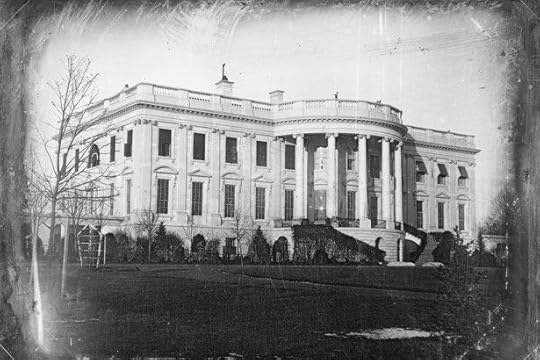
In her widely lauded speech at the Democratic National Convention on Monday, Michelle Obama reflected on the remarkable fact of her African American family living in the executive mansion. “I wake up every morning in a house that was built by slaves. And I watch my daughters, two beautiful, intelligent, black young women, playing with their dogs on the White House lawn,” she said.
On Tuesday, Fox News host Bill O’Reilly discussed the moment in his Tip of the Day. In a moment first noticed by the liberal press-tracking group Media Matters, O’Reilly said this:
As we mentioned, Talking Points Memo, Michelle Obama referenced slaves building the White House in referring to the evolution of America in a positive way. It was a positive comment. The history behind her remark is fascinating. George Washington selected the site in 1791, and as president laid the cornerstone in 1792. Washington was then running the country out of Philadelphia.
Slaves did participate in the construction of the White House. Records show about 400 payments made to slave masters between 1795 and 1801. In addition, free blacks, whites, and immigrants also worked on the massive building. There were no illegal immigrants at that time. If you could make it here, you could stay here.
In 1800, President John Adams took up residence in what was then called the Executive Mansion. It was only later on they named it the White House. But Adams was in there with Abigail, and they were still hammering nails, the construction was still going on.
Slaves that worked there were well-fed and had decent lodgings provided by the government, which stopped hiring slave labor in 1802. However, the feds did not forbid subcontractors from using slave labor. So, Michelle Obama is essentially correct in citing slaves as builders of the White House, but there were others working as well. Got it all? There will be a quiz.
O’Reilly’s comments were a small line at the end of the show, so one shouldn’t make too much of them. But the riff is notable for the way it resuscitates two common threads of apology for slavery: First, that human bondage didn’t play as large a role in American history as its critics might have you believe; and second, that it wasn’t as bad as they’d have you believe, either.
Obama’s invocation of the slaves who built the White House was rhetorically powerful because the building is a symbol of the United States; to say slaves built it is to imply that they built the United States. Pointing out that it was not only slaves who built it (in essence, debunking an assertion that Obama did not make) undercuts the point, and in turn connects to the long tradition of arguing that however bad slavery may have been, it was only a small, regional phenomenon in the South. But as my colleague Ta-Nehisi Coates has written, slavery was the engine of the entire antebellum American economy: “In the seven cotton states, one-third of all white income was derived from slavery. By 1840, cotton produced by slave labor constituted 59 percent of the country’s exports.” Coates quotes historian David Blight, who wrote, “Slaves were the single largest, by far, financial asset of property in the entire American economy.”
More immediately controversial was O’Reilly’s statement that slaves working at the White House “were well-fed and had decent lodgings provided by the government.” The idea that slavery was, if not a good thing, not such a bad thing overall has a long, if hardly venerable, intellectual history.
This defense of slavery as essentially benign runs, for example, through Senator John C. Calhoun’s 1837 speech defending the “peculiar institution” from the criticism of northerners. In a speech in which he labeled slavery “a positive good,” the South Carolinian contended that enslaved blacks actually had it good:
Compare his condition with the tenants of the poor houses in the more civilized portions of Europe—look at the sick, and the old and infirm slave, on one hand, in the midst of his family and friends, under the kind superintending care of his master and mistress, and compare it with the forlorn and wretched condition of the pauper in the poorhouse.
Some 20 years later, another senator from South Carolina, James Henry Hammond, made the same point. Speaking to Northerners, he contended:
The difference between us is, that our slaves are hired for life and well compensated; there is no starvation, no begging, no want of employment among our people, and not too much employment either. Yours are hired by the day, not cared for, and scantily compensated, which may be proved in the most painful manner, at any hour in any street in any of your large towns. Why, you meet more beggars in one day, in any single street of the city of New York, than you would meet in a lifetime in the whole South.
Of course, that wasn’t quite all of it. Hammond added that the manifest inferiority of blacks further not only justified but practically sanctified the endeavor:
We do not think that whites should be slaves either by law or necessity. Our slaves are black, of another and inferior race. The status in which we have placed them is an elevation. They are elevated from the condition in which God first created them, by being made our slaves. None of that race on the whole face of the globe can be compared with the slaves of the South. They are happy, content, uninspiring, and utterly incapable, from intellectual weakness, ever to give us any trouble by their aspirations.
It is not hard to find contemporary accounts from slaves who were neither happy nor content—and whose eloquent testimony accounts to their inspiration, capability, and intellectual powers. If many whites like Hammond were unable to see this, however, others were not so blinkered. As O’Reilly noted, Michelle Obama’s predecessor as first lady, Abigail Adams was living in the White House at the time when slaves were building it, and she recorded her observations of those working on landscaping the grounds.
“The effects of Slavery are visible every where; and I have amused myself from day to day in looking at the labour of 12 negroes from my window, who are employd with four small Horse Carts to remove some dirt in front of the house,” she wrote. Moreover, Mrs. Adams took note of their condition—and her observation stands at odds with O’Reilly’s:
Two of our hardy N England men would do as much work in a day as the whole 12, but it is true Republicanism that drive the Slaves half fed, and destitute of cloathing, ... to labour, whilst the owner waches about Idle, tho his one Slave is all the property he can boast.
Adams’s rebuke to O’Reilly is not the first time that a benign recollection of slavery has broken apart on the shoals of reality.

Russia Makes Its Own Rio

NEWS BRIEF What do you do when dozens of your athletes are banned from competing in the Olympics because of doping?
Host your own Olympics, of course.
Russia will hold a tournament for the track-and-field athletes who international sports officials last month barred from participating in the upcoming summer Olympics in Brazil, Yuri Borzakovsky, the head coach of Russia’s national team, told state-run news outlet TASS Wednesday. The event, which will take place at a Moscow stadium Thursday, will feature 135 athletes.
The lineup, according to TASS:
The track-and-field athletes who will compete in Moscow on Thursday include hurdle racer Sergei Shubenkov, incumbent world champion in a 110-meters race; high jumpers Maria Kuchina, Olympic Champion Ivan Ukhov and Daniil Tsyplakov; javelin throwers Dmitry Tarabin and Vera Rebrik; triple jumper Yekaterina Koneva.
After the International Association of Athletics Federations (IAAF) decided in June to kick out Russian track-and-field athletes over widespread use of performance-enhancing drugs—and after the International Olympic Committee (IOC) supported that decision—Russia braced itself for a potential blanket ban on its athletes from this year’s games. An investigation by the World Anti-Doping Agency (WADA) had found that the Russian government operated a state-sponsored doping program between 2011 and 2015, during summer and winter Olympic games, including the Sochi games in 2014. Testing of old samples from Russian athletes who competed in earlier games had revealed the presence of illegal drugs. But on Sunday, the IOC chose not to ban all Russian athletes from Rio, and instead decided to require the athletes accused of doping to appeal to international federations, or the governing bodies, of their respective sports to determine whether they can participate.
Thirteen individual Russian athletes have so far been barred from Rio by those governing bodies, AFP reported Wednesday. They include seven swimmers, two weightlifters, three rowers, and one wrestler. One of the swimmers, Yulia Efimova, said this week she would appeal her ban.
Shubenkov, Kuchina, and Ukhov—three of the athletes competing in Thursday’s special tournament in Moscow—were among 68 athletes of the track-and-field program who the June ban, but were rejected.

Oh, Chad! The Making of The Bachelorette's Most Authentic Villain

[Warning: Minor spoilers ahead.]
Early on in this season of The Bachelorette, the guys, in their copious downtime together, put together a little ceremony. To celebrate the departure of Chad, the show’s resident villain and the contestant who was as literal a meathead as you can get (the show’s camera crew managed to get several shots of him, at various times, threateningly chomping on cold cuts), the remaining dudetestants threw him a mock funeral. “Gentlemen,” said Wells (Radio DJ), solemnly, “we are gathered here today to celebrate arguably the worst person anyone has ever met. Tonight, we say farewell to quite literally the [expletive] person who has ever been on either The Bachelor or The Bachelorette. Chad: farewell, sweet prince. Death to tyrants.”
Related Story

The (Booze-Infused, Bikini-Clad) Values of The Bachelor
This was, to be clear, absurd. (The guys would proceed to find one of the Costco-sized tubs of protein powder that Chad had brought with him onto the show, each take a handful of the stuff, and then scatter the powder, mock-ceremonially, to the wind.) But the faux-funeral was a perfect sendoff for a villain whose particular brand of villainy reveled in the ridiculous. The Bachelorette, following the practice of its brother show, tends to reduce its human participants to characters, and often to chyrons. The show lists, as a matter of chyronic course, only four things about each contestant: First name, age, current place of residence, and profession. (The professions of the current season included “Hipster,” “Erectile Dysfunction Specialist,” and “Canadian.”) Chad is, officially, a “Luxury Real Estate Agent,” but it was clear from the beginning what he more meaningfully was to this season of The Bachelorette, as it engaged in its ad-absurdum reductions: the show’s villain. But Chad wasn’t just any villain: He was a uniquely ridiculous villain. He turned that classic trope of reality TV—the stuff of Omarosa and “Nasty Nick” and Angelina—inside-out, highlighting the absurdity of its demands. Chad was a reality TV villain who used his villainy to mock reality TV itself. He was performance art, with protein powder.
It was Chad who had said, in The Bachelorette’s also-absurd pre-premiere questionnaire, that his “greatest achievement to date” was “being born good looking.” (Oh, Chad.) It was Chad threatened violence against several of his castmates. And who took to whistling, menacingly, as he walked around the Bachelor/Bachelorette mansion. Chad, at one point, he scraped his fingers down a glass door, the resulting squeeeeak duly creeping out the guys on the other side. He chose solitary workouts—he used that tub of protein powder, enterprisingly, as a weight for his pull-ups—rather than hanging out by the pool with his fellow fellas. He accused JoJo, the season’s eponymous single lady, of “nagging” him.
Chad was calling the show’s many bluffs and reveling in them at the same time. It was glorious. It was art.
This last one was too much. That was the height, despite Chad’s punch-drunkenness and his horror-movie antics, of his villainy. One of the unwritten rules of The Bachelorette is that you fall in love, immediately, with the Bachelorette in question, and your love will make you unable to question or doubt her superiority to every other woman on Earth. “Nag” does not have a place within this idealized moral universe.
But Chad—oh, Chad—ignored those mandates. He took the show for what it is, which is an absurd farce that contestants use to maybe “find love,” but more often to transform themselves, via the alchemy of television, into B-list celebrities. (Ali Fedotowsky, a contestant on The Bachelor and then a star of The Bachelorette, took a job as a correspondent for E! News; Ben Higgins, from the last season of The Bachelor, may now be running for office.) Chad reveled in that absurdity. He refused to operate by the show’s many, many unwritten rules, and instead portrayed himself—or, more accurately, let The Bachelorette’s producers portray him—as a kind of dada hero. Chad was decidedly campy in his villainy (sometimes literally, as when he and Alex found themselves fighting over JoJo during a double date in the wilderness of Pennsylvania):
Chad: Get over it. Have a glass of milk, man.
Alex: I don’t like milk. Don’t like milk. Don’t need it.
Chad: You should. Milk’s delicious.
Again: absurd! But also kind of perfect! Was he shilling for Big Milk? Or was he just being true to himself? Does it matter? The Bachelor is a franchise that comes with its own advertising tie-ins (last season’s was, inexplicably, Manwich; this season’s is Clorox, apparently because The Bachelorette, like life itself, is full of “bleachable moments”). It’s a series of shows that, via their “exotic locations”—including, this time around, Argentina, Thailand, and, of course, Pennsylvania—emphasizes the “place” in “product placement.” Chad’s lactic acidity was, really, no weirder than anything else the show has put forward in its awkward attempt to marry the marketing of products with the marketing of humans. It was even, in its way, a celebration of it. Chad was calling the show’s many bluffs and reveling in them at the same time. It was glorious. It was art.
So it was fitting that, on Tuesday night’s The Bachelorette: The Men Tell All special, while JoJo came back—to “face” Luke and the other guys she’d rejected (or, in the show’s soft parlance, the men she’d “said goodbye to”)—the real drama revolved around Chad. The show’s host, Chris Harrison, teased the appearance, and encouraged the gathered men to speak ill of him before he materialized. Evan (Erectile Dysfunction Specialist): “Chad was real the way Donald Trump is real.” Derek (Commercial Banker): “He’s an episode of Cops waiting to happen.” Wells (Radio DJ): “He’s like Voldemort.”
Chad has also been a U.S. Marine—and yet that mild complication of his villain edit (a villain cannot be a hero) went largely unacknowledged as the show played out. On the The Men Tell All special, Chris interrupted Luke so that the audience might thank him for his service; Chad, meanwhile, was thanked by a shot of him pulling a piece of jerky from his suit pocket and chomping on it, menacingly and weirdly and, well, jerkily.
Evan (Erectile Dysfunction Specialist): “Chad was real the way Donald Trump is real.”
The Bachelorette is a guilty pleasure in the most meaningful, and legitimate, sense of the term: It is aggressively heteronormative, and it is relentlessly superficial, and it has a terrible record with diversity. It reduces full humans to candle-lit caricatures. It also manages, Moroccan lanterns and roses notwithstanding, to denude romance itself. One of the best things you can say about a show that treats romance as a contest is that it imposes order on a process—“finding love,” in the show’s parlance—that, in the world beyond TV, can often be filled with uncertainty. Going on a trip together, spending the night together, meeting the parents, committing to exclusivity … all of it takes place, with The Bachelorette’s universe, on a rigid timeline.
One of the worst things you can say about a show that treats romance as a contest, however, is that it treats love—that ineffable, unpredictable, mysterious thing—as a mandate. These guys have to fall in love, or more precisely they have to claim to fall in love, with JoJo; otherwise, they will be kicked off the show. Here, love and fame are intimately, and awkwardly, related. The contestants know that, and are made anxious by it; that is what makes contestants’ accusing each other of being there for fame such a consistent feature of the show. It’s what makes claims of “being here for the right reasons” such a reliable refrain, season to season.
Chad exploits that, too. During Tuesday’s special, he accused Jordan, a finalist and long a front-runner for JoJo’s affections, of appearing on the show as an audition for a sportscasting gig. (Was Chad also, in that accusation, referencing UnREAL, the fictional satire of The Bachelorette that found one of its cast members appearing on the show with the exact same goal in mind? Maybe! Who knows. What is truth. Etc.)
Mostly, though, Chad exploits absurdity itself. And, in that way, he ends up being the realest person on this particular reality show. Tuesday’s The Men Tell All special featured fake candles, and fake roses, and JoJo thanking her “cast members” for being “upstanding men” in their courtship of her. It featured a cameo from the mother of Vinny (Barber), yelling at JoJo that she’d made a mistake saying goodbye to her son. (“You shaved him, you took his facial hair, and you let him go!” the mom exclaimed, angrily, as the audience laughed.) The showed piled absurdity after absurdity. And then it featured Chad advising his fellow dudes about their relationship with JoJo, “Get to know her before you fall in love with her.”
This was not good advice so much as it was the most obvious idea in the world. But the crowd booed. Because Chad is the villain, and because he is a jerk, and because “knowing” the object of one’s love has never, ever been the point of The Bachelorette. So Chad duly returned to his schtick. “Sometimes you choose apples when you should’ve loved pickles,” he told Chris, smiling. The crowd laughed, and Chris rolled his eyes, and all, once again, was right with the world.

Where's A Pied Piper When You Need One?
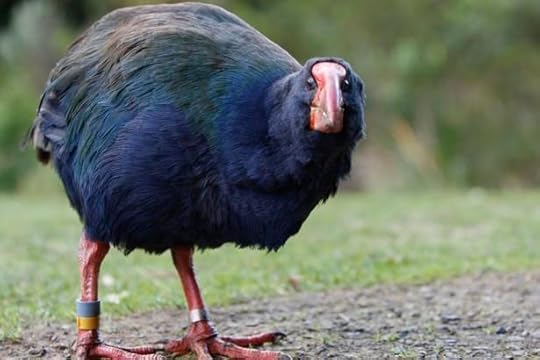
NEWS BRIEF New Zealand wants to eradicate invasive animals so it can save its indigenous birds.
The predators—weasels, possums, stoats, and rats—were first brought ashore by the Maoris an estimated 700 years ago. The animals are largely responsible for killing birds such as the kiwi and the takahe that live nowhere else in the world.
The government’s plan, announced Monday by Prime Minister John Key, will be one of the first programs to remove an invasive species from an entire country.
“Our ambition is that by 2050 every single part of New Zealand will be completely free of rats, stoats and possums,” Key said in a statement.
New Zealand spends more than $40 million each year fighting invasive species, but they cost the country $2.3 billion through damage to native plants, animals, and through the spread of disease. This new plan would devote an additional $20 million to set up a company to run the rodent-and-weasel-killing program.
One controversy around the plan is the feline problem. Some of New Zealand’s birds evolved to become flightless, and they make easy prey for cats. New Zealanders own more cats per capita than citizens of most other parts of the world. Key himself is a cat-lover; his cat’s name is Moonbeam Smokey Fluffy Key.
Feral cats, Key said, have to go. House cats will be an exception, however, so domesticated pets such as Moonbeam will be safe.

Atlantic Monthly Contributors's Blog
- Atlantic Monthly Contributors's profile
- 1 follower



